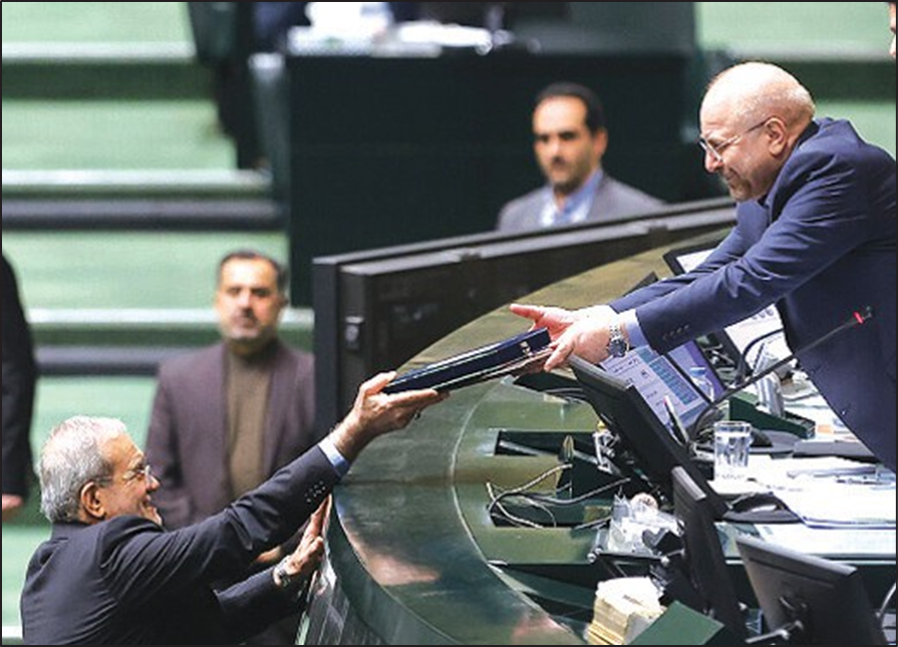and even ordered a US aircraft carrier not to return through the strait to the Persian Gulf.
Many of the wilder remarks came from Majlis deputies, who do not make policy.
But the order to the USS John C. Stennis not to pass through the strait again was made by the commander of Iran’s ground forces.
That in itself prompted much head-scratching, with people asking why a ground forces commander was issuing naval orders.
The wildest remark stated that Iran would henceforth have to give permission for warships of any country to pass through the strait.
That came from Majlis Deputy Nader Qazipur, who said, “If the warships of any country seek to pass through the Strait of Hormuz without first receiving the permission of Iran’s naval forces, they will be stopped by the Iranian armed forces.”
Taqipur appeared unaware of the fact that the two sea lanes that pass through the Strait of Hormuz both lie entirely within Omani waters. The warning to the aircraft carrier Stennis came from Gen.
Ataollah Salehi just seven days after the Stennis exited the Persian Gulf for a new duty station in the Arabian Sea. Gen. Salehi told the Stennis not to go back into the Persian Gulf. “We generally don’t repeat our warnings,” he said. “We warn only once.
We recommend and emphasize to the American carrier not to return to the Persian Gulf.” Salehi failed to explain why he was issuing such an order, or how he thought he had such authority.
Many analysts viewed Salehi’s remarks as beyond silly. One said, “This shows very poor judgment, even if you take the comments as mere rhetoric meant to show toughness to the domestic Iranian audience.
The Stennis or its successor will pass through the strait into the Persian Gulf and Iran will be able to do nothing, leaving Salehi with egg all over his face and Iran looking weak.” In the past week, two Majlis deputies have both said the Islamic Republic is prepared to close the Strait of Hormuz if Iran is merely “threatened.”
In the past, Iran has frequently said it would close the strait if its oil exports were stopped, saying that, if it could not use the strait, no one else would be allowed to use it.
But the suggestion that Iran would block the strait after a mere threat was taken as ridiculous since Iran is the sole Persian Gulf state to export all its crude through the strait; all the others can export some part of their production by pipelines to bypass the strait.
Deputies Kazem Jalali and Aziz Akbarian made the closure threat in separate statements Monday.
Threats to close the strait under some scenario began last Tuesday, December 27, when First Vice President Mohammad-Reza Rahimi said Iran would block the strait if Iranian oil were banned from the market in other words, if Iran cannot use the strait to export oil, no one will be able to do so.
Some thought the purpose behind his rhetoric was to try to scare some members of the EU so they would oppose the EU plan to boycott all Iranian crude oil. Since then, there has been a long line at the microphone of officials eager to sound tough.
The most interesting comment came from Rear Admiral Habibollah Sayyari, the commander of the Iranian Navy, who said that closing the strait would be “easier than drinking a glass of water.”
The interesting thing about this comment is that it came from the Navy’s chief but the Iranian Navy’s assigned area is the waters beyond the strait. It is the Pasdar maritime command that handles the Persian Gulf and the Strait of Hormuz.
And through this week of chest-thumping and table-pounding, the Pasdar maritime command has maintained complete silence.
In Washington, State Department spokesman Mark Toner called all the threatening language mere “bluster.” He said such talk was just “another attempt by them to distract attention from the real issue which is their continued noncompliance with international nuclear obligations.”
Not everyone in Tehran was enthralled by all the rhetoric from Iranian officials. One Oil Ministry official, who rationally asked that his name not be used, told The Washington Post, “We would be committing economic suicide by closing off the Hormuz Strait.
Oil money is our only income, so we would be spectacularly shooting ourselves in the foot by doing that.” Bahman Nirumand, a journalist in Tehran, was not so quick to dismiss the threats as hollow rhetoric. He told Deutsche Welle, the German radio network, that everyone in the Iranian government is fully aware that closing the strait is an act of war that would require US military action.
He said some radicals would actually welcome a military conflict. “They hope it would increase their power,” he said. “In Iran, there is an enormous power struggle between different factions.
This can be seen in the way the foreign minister says completely different things from the military. The question is which faction can prevail and what the Supreme Leader decides.”
US Navy planners say there is no question that Iran could close the strait by mining it and/ or by stationing anti-ship missiles on Iranian land adjacent to the strait. But they say the US Navy could clear the strait and the nearby land within several days to a few weeks and restore the strait to service.
What no one addresses is whether this action would include seizing a block of Iranian territory adjacent to the strait to prevent the Iranian military from ever returning. Some think Iran would only use mines in the strait.
The US Navy and regional Arab navies would take some time to clear the strait. In that time, oil prices would likely soar, if only temporarily, and Iran would make a nice profit. But Iran would likely pay a political penalty for closing the strait even temporarily and would find itself with even less support around the world than now.
Support for sanctions on Iran would likely grow. Gen. Martin Dempsey, the new chairman of the US Joint Chiefs of Staff and the highest ranking officer in the US military, told CNN last week that the Pentagon has designed a military plan for Iran that is “executable if necessary” but which would be “a tragedy for the region and the world.” In Moscow, Adm. Ivan Kapitanets, the vice commander of the Russian Navy, sneered at the tough talk from Iran.
“The Iranian Navy is coastal and can protect the country’s interests in coastal waters,” he said. “As for the Americans, they have full- scale oceanic naval forces.
Therefore, there can be no comparison here. An aircraft carrier with its deck fighters and escort ships can smash Iranian coastal installations and surface ships,” the admiral said.



















